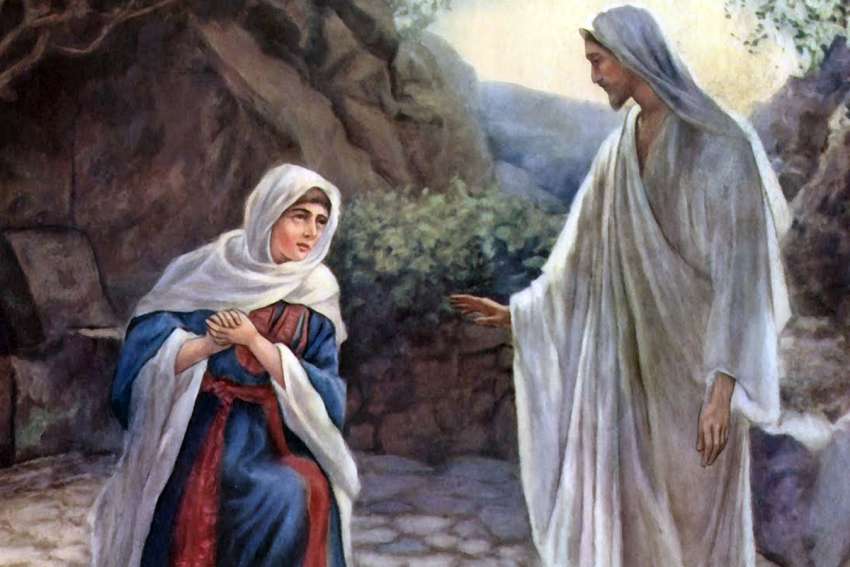Then, bingo! After suffering the cruelest of deaths, Jesus rose from the dead and ascended into Heaven. He no longer had to deal with the trials of material bodiliness — the aches, illnesses, exhaustion, territoriality and death that beset human existence. After the Resurrection, Jesus has a body, but it is a “spiritual body,” one freed from the messiness of human existence. The supposed good news is that if we follow Jesus, we too will be set free from the dirty, grimy earth.
This is a horrible image of the Resurrection, one which turns its back on the Incarnation. It ignores that the risen Lord was still able to enjoy a meal with His companions. It ignores also that in John’s Gospel, Jesus’ first post-Resurrection appearance was to Mary Magdalene, who thought Him to be the gardener.
A few years ago, I had the privilege of editing the Living with Christ missalette for a year. One of my decisions that caused some readers consternation was the choice of a front cover image of the scene where Mary and the gardener meet on Easter. Jesus was roughly dressed — one reader complained that He looked like a pirate — and ready for a day of manual labour.
But it was a beautiful image, one which affirmed that the risen Christ remains with us in our toils even after His Resurrection. Although He returned to the Father, He did not shirk the Incarnation.
Indeed, one of the first images of God in the Bible is that He was a gardener, an image that the early readers of John’s Gospel would recall. The author of Genesis wrote, “The Lord God planted a garden in Eden, in the east; and there He put the man He had formed” (2:8). God had, in fact, already put His own hands into the soil to form that first man. God has no shame in using the soil to fashion His most beloved creature.
The Second Vatican Council taught that Christ left a pledge of the eternal Kingdom in the natural elements which are sacramentally transformed into His glorified body and blood. Our bodily resurrection will bring us not only into a new Heaven but also a new Earth. Creation will not be destroyed but transformed. Likewise, the fruits of our earthly labours will be illumined and transfigured, cleansed from the bondage of sin. Through our earthly actions we literally fashion our eternal home (Gaudium et Spes, 38-39).
God is a gardener, and we are gardeners, too, in how we grow our lives. We ought to give serious consideration to how we cultivate the soil of earthly life.
The modern world has turned its back on the earthiness of human and divine life. The over-development of technology removes us ever more from the natural elements God created. This is not to say that digital technology is bad while low-tech gardening agriculture is good. But we have lost our balance. A world dominated by artificial intelligence, the exploitation of nature for profit, and a fear of soil and creatures erodes our human capacities.
People are created for one ultimate purpose — to love God and through God to love our neighbour. We exist to nurture life-giving relationships. It is not a reach to say that this nurturing includes a bonding with the air, the sea and the land.
Because we are so cut off from those natural elements, we think nothing of exploiting them for our self-centred purposes. As well, our alienation from the soil out of which God formed us contributes to “civilized” humanity’s falling away from God Himself. If we don’t value creation, how can we value the Creator? How can we follow God incarnate?
Those societies which preserve their bond with nature often treasure their relationships with the divine. It is a sad irony that societies which reduce their love for the natural environment to the preservation of patches of wilderness also tend to put God in a box to be visited only on special occasions.
Christ is risen! Truly He is risen! If the Spirit of God dwells in you then He who raised Christ from the dead will also give life to your mortal body.
(Glen Argan writes his online column Epiphany at https://glenargansubstack.com.)


